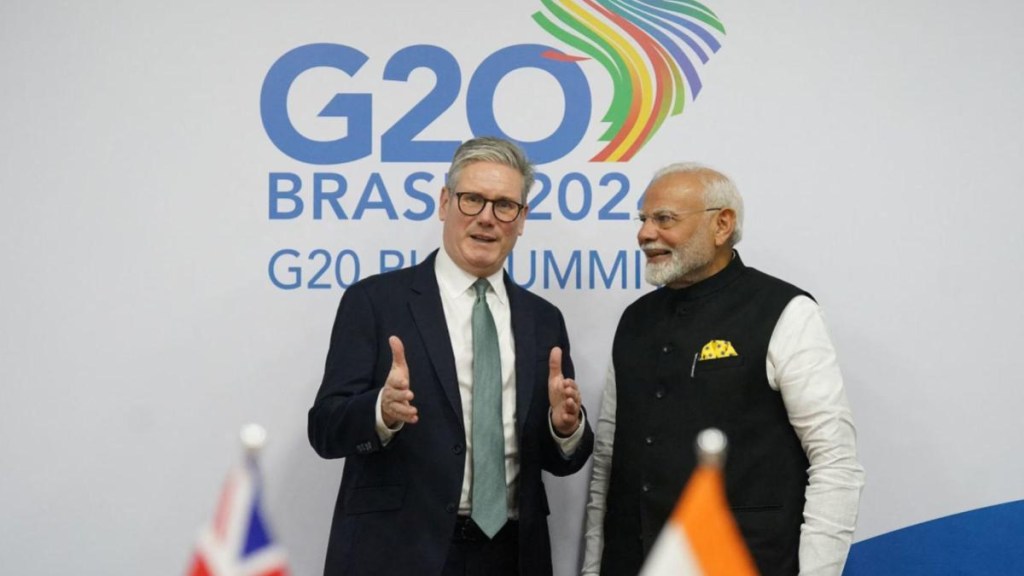India and the United Kingdom signed a landmark Free Trade Agreement (FTA) on Tuesday, finally sealing the deal after more than three years of intense, stop-start negotiations. Coming at a time when protectionist policies are rattling global markets, especially with US President Donald Trump’s latest tariff offensive, this pact signals a bold step by both nations to deepen economic cooperation and hedge against growing trade uncertainty.
Negotiations for the India-UK FTA began in January 2022 and were delayed by frequent leadership changes in Britain and elections in both countries. Despite these hurdles, the world’s fifth and sixth largest economies have now finalised what both governments describe as an “ambitious and mutually beneficial” partnership.
Prime Minister Narendra Modi announced the deal on X, saying it has potential to “catalyse trade, investment, growth, job creation and innovation” in both countries. UK Prime Minister Keir Starmer echoed this sentiment, calling it a “new era for trade”.
Why does the deal matter?
The timing of the FTA is crucial. In early April, President Trump reintroduced sweeping tariffs on steel, aluminium and automobiles, prompting countries across the globe to look for alternative trade partnerships.
For the UK, the agreement represents its most substantial trade pact since Brexit, with government projections estimating it will contribute £4.8 billion annually to British GDP by 2040. The FTA will reduce or eliminate tariffs on a wide range of goods and services, including:
Whisky: tariffs cut from 150% to 75%
Automobiles: tariffs reduced from 100% to 10% under a quota
Textiles and apparel: 99% of Indian exports to see zero-duty access
Medical devices, machinery and lamb: UK exporters to benefit from lower tariffs
The deal also allows UK companies greater access to public procurement contracts in India and creates new pathways for Indian professionals to work in the UK.
Beyond trade and tariffs, the agreement carries geopolitical weight. It signals India’s willingness to open its long-protected markets, including sensitive sectors like automobiles and positions the country as a flexible trade partner to major Western economies.
At the same time, it underscores Britain’s post-Brexit strategy of pursuing bilateral agreements to strengthen its global economic standing.
India Inc reacts
Indian industry leaders have praised the agreement. Harsha Vardhan Agarwal, President of the Federation of Indian Chambers of Commerce and Industry (FICCI), said, “It brings new momentum to sectors like FMCG, healthcare and innovation-driven enterprises.”
FICCI believes the pact will help Indian exporters significantly boost their footprint in the UK market and welcomed the inclusion of the Double Taxation Avoidance Convention, which will reduce the tax burden on businesses operating across borders.
Currently, bilateral trade between India and the UK stands at over $50 billion and the FTA is expected to multiply this volume in the coming years.
Key takeaways from the deal
- India will reduce import duties on 90% of tariff lines. Within a decade, 85% of these items will become completely tariff-free
- India agrees to lower tariffs on whisky, medical devices, machinery and lamb
- Duties on whisky and gin will be halved from 150% to 75% and eventually lowered to 40% over ten years
- India secures benefits in key UK service sectors like IT, finance, professional and educational services
- Auto import tariffs will fall from over 100% to 10% under a quota-based system
- Indian sectors such as textiles, leather, toys and gems will enjoy increased access to UK markets
- The agreement grants 99% of Indian exports duty-free access to the UK market, covering nearly 100% of trade value
- Tariff cuts on cosmetics, chocolate, biscuits, soft drinks, medical equipment and more will benefit both businesses and consumers
- British consumers will see price reductions on Indian apparel, footwear, prawns and other food products
- Indian professionals in the UK will be exempt from social security contributions for three years, along with their employers, yielding major cost savings
- The FTA is expected to generate jobs in labour-intensive sectors

